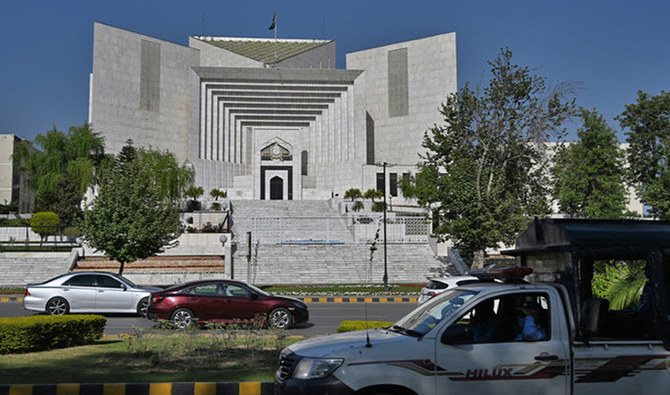ISLAMABAD: Fresh controversy brewed in Pakistan on Wednesday after the Supreme Court ruled that general elections in Khyber Pakhtunkhwa and Punjab, under caretaker governments since the provincial assemblies were dissolved in January, should be held within 90 days, with the law minister and legal experts taking differing interpretations of the judgment and its implications, sparking concerns the government may decide not to implement the decision.
Former prime minister Imran Khan’s Pakistan Tehreek-e-Insaf (PTI) party dissolved the KP provincial assembly in January, while the chief minister of PTI’s allied party, the PMLQ, dissolved the Punjab assembly the same month, with both moves aimed at forcing the federal government to announce early national elections.
However, the caretaker governors of both provinces declined to give dates for fresh elections and referred the matter to the Election Commission of Pakistan (ECP). As the deadlock continued, the president unilaterally announced polls in both provinces on April 9.
The Supreme Court of Pakistan intervened last week, taking suo motu notice of the situation to settle a matter on which most legal experts say the constitution is clear: elections need to be held within 90 days after the dissolution of an assembly.
“The elections within 90 days after the dissolution of an assembly are mandatory,” Chief Justice Umar Ata Bandial said while reading the 3-2 judgment, in which Justice Mansoor Ali Shah and Justice Mandokhail jointly dissented with the verdict.
However, a controversy over the judgment emerged after Law Minister Azam Nazeer Tarar said petitions for the court to decide on election dates had been rejected by a 4-3 majority. He was referring to the fact that the five-member bench that heard the case was originally a nine-member bench from which four judges recused themselves. Even before the recusation, two of the judges had objected to whether the Supreme Court could hear the case at all.
“I am of the view that these petitions have been dismissed with a 4-3 majority, as on February 23, when the case was first heard, Justice Athar Minallah and Justice Yahya Afridi had clearly stated that the pleas are not maintainable,” Tarar said in an interview to Geo News.
He said the suo motu notice taken under Article 184(3) by the Supreme Court was invalid as the matter was already pending before the high courts in KP and Punjab.
“Today, two more judges said that the petitions were not maintainable, so in my opinion, it’s a 4-3 verdict.”
He referred to a past case against former prime minister Nawaz Sharif when a split verdict of a five-member bench was later merged as a 5-0 verdict.
This issue, Tarar said, should now be adjudicated in respective high courts.
Barrister Muhammad Ahmad Pansota told Arab News it was a footnote added to the 13-page judgment, which was not “routine practice,” which had opened up space for the law minister and others to try to make the judgment controversial.
The footnote states that initially, a nine-member bench heard the matter but the bench was reconstituted into a five-member bench later on.
“The decisions of the aforementioned two Hon’ble Judges [Justice Minallah and Justice Afridi] dated 23.2.2023 form part of the record of this case,” the judgment’s footnote reads, referring to the two judges two challenged the SC hearing the case at all.
“Adding a footnote in the judgments is not a routine practice, but still there is no ambiguity in this judgment itself,” Pansota said. “It is a clear-cut and strong judgment which must be enforced in letter and spirit.”
Advocate Mehmood Sheikh said Law Minister Tarar’s opinion was “routed in error” as it was, at the end of the day, heard by a five-member bench which gave a 3-2 majority decision.
“There is no confusion in this judgment whatsoever,” Sheikh told Arab News. “The judgment is written and announced by the judges who hear a case, not by those who partially remain part of a bench and then recuse themselves for any reason.”
Advocate Sameer Khosa said it was a majority judgment and binding on the election commission and all government authorities to follow and implement.
“The view of the law minister seems to be political on it as the verdict is quite clear,” he told Arab News. “If the government or anybody has any reservations or confusion over the judgment, they can file a review petition for clarity.”
Meanwhile, the ECP has sought applications from all political parties for the allotment of election symbols for the forthcoming general elections in the provincial assemblies of Punjab and KP, latest by March 8.
“Applications received after the due date will not be entertained,” the ECP said in a statement on Wednesday.
















